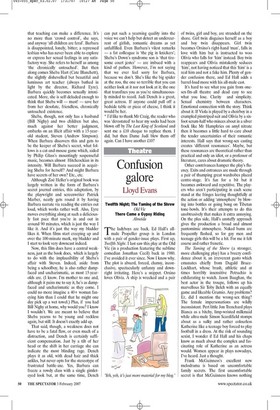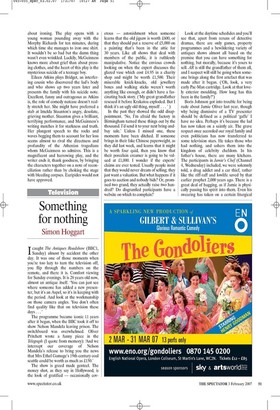Confusion galore
Lloyd Evans Twelfth Night; The Taming of the Shrew Old Vic There Came a Gypsy Riding Almeida The ladyboys are back. Ed Hall's allmale Propeller group is in London with a pair of gender-issue plays. First up, Twelfth Night. I last saw this play at the Old Vic (in a production featuring the sublime comedian Jonathan Cecil) back in 1980. I've avoided it ever since. Now I know why. The plot is absurd, forced, clumsy, inconclusive, spectacularly unfunny and downright irritating. Here's a snippet. Orsino loves Olivia. A ship is wrecked and a pair of twins, girl and boy, are stranded on the shore. Girl twin disguises herself as a boy and boy twin disappears. Girl twin becomes Orsino's right-hand 'man', falls in love with him but is instructed to woo Olivia who falls for 'him' instead. Boy twin reappears and Olivia mistakenly seduces 'him', not having noticed that this 'him' is a real him and not a fake him Plenty of gender confusion there, and Ed Hall adds a barrel-load more with his all-male cast.
It's hard to see what you gain from onesex-fits-all theatre and dead easy to see what you lose. Clarity and simplicity. Sexual chemistry between characters. Emotional connection with the story. Think about it. If Viola is played by a choirboy in a crumpled pinstriped suit and Olivia by a sixfoot scrum-half who minces about in a silver frock like Mr Humphries on amyl nitrate then it becomes a little hard to care about the tender uncertainties of their romantic interests. Hall says that wrong-sex casting creates 'different resonances'. Maybe, but these resonances are theoretical rather than practical and only an idiot, or a professor of literature, cares about dramatic theory.
Other contrivances hamper the play's fluency. Exits and entrances are made through a pair of thumping great wardrobes placed centre-stage. It's fun for a bit but it becomes awkward and repetitive. The players who aren't participating in each scene stand at the fringes leering thoughtfully at the action or adding 'atmosphere' by blowing into bottles or going bong on Tibetan tone-bowls. It's their attempts to do this unobtrusively that makes it extra annoying. On the plus side, Hall's unstuffy approach gives the production a broad and almost pantomimic atmosphere. Naked bums are frequently flashed, so for gay men and teenage girls this will be a hit. For me it felt coarse and rather frenetic.
The Taming of the Shrew (a stronger, more challenging play) has a breezy confidence about it, an irreverent gusto which emanates chiefly from Dugald BruceLockhart, whose brash, athletic and at times horribly insensitive Petruchio is exhilarating to watch. Jason Baughan, the best actor in the troupe, follows up his marvellous Sir Toby Belch with an equally game and likeable Grumio. Any problems? Er, did I mention the wrong-sex thing? The female impersonations are wildly inconsistent. Pert little Jon Trenchard plays Bianca as a bitchy, limp-wristed milkmaid while ultra-male Simon Scardifield stomps about as a sulky and rather colourless Katherine like a teenage boy forced to play football in a dress. At the risk of sounding sexist, I wonder if Ed Hall and his chaps know as much about the complex and fascinating role of Katherine as an actress would. Women appear in plays nowadays, I've heard. Just a thought.
Frank McGuinness's excellent new melodrama is based on uncomfortable family secrets. The first uncomfortable secret is that McGuinness knows nothing about ironing. The play opens with a young woman pounding away with the Morphy Richards for ten minutes, during which time she manages to iron one shirt. It wouldn't be so bad but the damn thing wasn't even wrinkled. Luckily, McGuinness knows more about grief than about pressing clothes, and the heart of this play is the mysterious suicide of a teenage boy.
Eileen Atkins plays Bridget, an interfering cousin who discovered the lad's body and who shows up two years later and presents the family with his suicide note. Excellent, funny and outrageous as Atkins is, the role of comedy nutcase doesn't really stretch her. She might have preferred a stab at Imelda Staunton's angry, desolate, grieving mother. Staunton gives a brilliant, terrifying performance, and McGuinness's writing matches it for starkness and truth. Her plangent speech to the rocks and waves begging them to account for her loss seems almost to rival the directness and profundity of the Athenian tragedians whom McGuinness so admires. This is a magnificent and harrowing play, and the writer ends it, thank goodness, by bringing the characters together on a note of reconciliation rather than by choking the stage with bleeding corpses. Euripides would not have approved.





















































 Previous page
Previous page